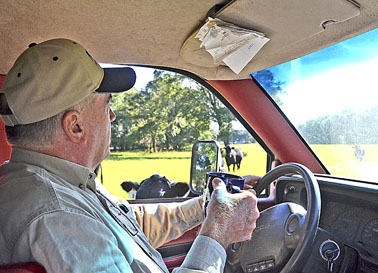CARL MCKINNEY/Alachua County Today
Ashby Green sips on his cup of coffee during an early morning drive through a field of cattle. He and Roger West raise cattle on eight different locations throughout Alachua County, including Alachua, Newberry and Gainesville.
ALACHUA – Every cut of beef and vegetable leaf in Hitchcock’s supermarket represents countless hours of labor from 2 percent of the American population.
This week, the Florida Farm Bureau is celebrating Farm-City Week, honoring the men and women who work to supply the food lining the shelves of grocery stores.
Farmers like Roger West, who raises cattle in eight locations across the county, make up the 2 percent of Americans who feed the country.
“A lot of people don’t really realize where their food comes from and how much work it takes to reduce it and process and get it to them,” West said.
West raises around 350 cattle each year across 1,800 acres of land around Alachua County.
He works six or seven days a week, making sure his cattle are healthy, have a good weight and have a decent amount of food and water.
“From the standpoint of cattle production, it’s about 75 percent science and 25 percent art,” West said.
Better understanding of genetics and nutrition has allowed American farmers to get the same amount of beef that was being produced in the 1950s with far fewer cows, he said.
“Each cow is producing more beef through technology,” West said.
The University of Florida has been a leader in performing the research that helps farmers be more efficient with their livestock.
One of the farms West works lies between Alachua and High Springs, just off U.S. Highway 441. Jeffords Farm was named after Belle Jeffords, an active participant in the Alachua County Cattlemen’s Association. It was named after her to carry on her legacy of good stewardship and responsible land use, said Ashby Green, West’s business partner.
“This farm and the people running it are doing the right things,” he said. Jeffords Farm cooperates with the Suwannee River Water Management District to use its resources responsibly.
Around 10 a.m. on a cool Tuesday morning, Green rolled up to the farm in a white truck, ready to talk about the life of a cattleman.
Green, a former veterinarian, looked at the weight of the livestock to make sure they are ready for winter. They are weighted on a scale of one to 10. For this time of the year, a six or seven is optimal, he said.
He walked through the fields, giving off a call to the cows. They waited until he got too close before dispersing, keeping their distance from Green.
“They have a lot of personality,” he said. “They’re very much like people.”
The biggest challenge facing farmers today is educating the consumer on how cattlemen produce beef, West said.
Farm-City Week runs from Nov. 22 to Nov. 28, and is intended to celebrate the relationship between farmers and supermarkets, honoring their contributions to the quality of life of Floridians and people across the country, according to the Florida Farm Bureau.
Every time someone buys food, whether it is local or not, it helps the market and supports farmers, said Micanopy farmer John Newbanks.
“We should be appreciated at least three times a day when you sit down for your meals,” said farmer Green.
# # #
Email cmckinney@
alachuatoday.com
From the farm to the fork
Tools
Typography
- Font Size
- Default
- Reading Mode
